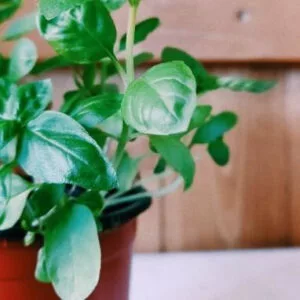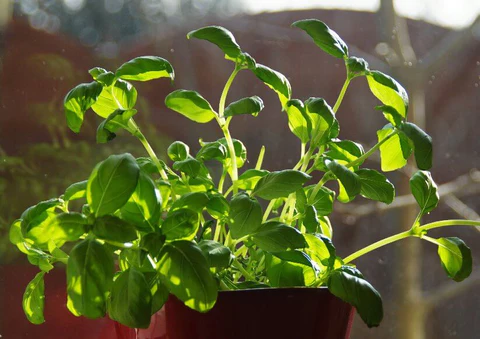Basil Green Seeds (20 seeds)
₹39.0
These extremely aromatic leaves also have a delightful variety of flavours, from the slightly lemony mint of sweet basil to cinnamon and liquorice. Leaf colours span to rich green. The flowers are insignificant but very popular with bees. Try our Non-GMO Basil Green Seeds. Also, check out our workshops for more details.
PRODUCT DESCRIPTION
Number of seeds in a packet – 20
PLANT DESCRIPTION
- Difficulty Level – easy
- Plant Height – 12 – 24 inches tall
- Type – indoor (balcony/ terrace)
- Aroma – spicy
- Flavour –slightly bitter
- Feed – Vermicompost for nutrients every week, Seaweed once a month for greener leaves and Epsom salt for better blooming once a month
- Watering – 1 inch of water every week
- Sunlight – 6 – 8 hours of sunlight
- Germination Time – 1 week
- Suitable Temperature – 65°F – 75°F
- Season – annual
- Sowing – spring
HOW TO GROW BASIL GREEN FROM SEEDS
- Take a Growbag and fill it with Cocopeat.
- Sprinkle the seeds around the Growbag.
- Fill the hole with Cocopeat lightly and spray water using a spray gun or spray bottle.
- Keep the soil moist not soggy.
- Seeds will germinate within a week.
- Full sunlight is needed.
ALTERNATE METHOD
- Take a Medium Size Pot and add a Potting Mix.
- If planting in the soil add Neem Cake Powder, Vermicompost and Seaweed.
ALTERNATE NAME
Botanical name: Ocimum tenuiflorum
basil green seed in hindi: tulasee hara beej (तुलसी हरा बीज)
basil green seed in tamil: tulaci paccai vitai (துளசி பச்சை விதை)
basil green seed in telugu: tulasi akupacca sid (తులసి ఆకుపచ్చ సీడ్)
basil green seed in kannada: tulasi hasiru bija (ತುಳಸಿ ಹಸಿರು ಬೀಜ)
basil green seed in marathi: tulasa hiravi biyane (तुळस हिरवी बियाणे)
basil green seed in malayalam: thulasi pacha vithu (തുളസി പച്ച വിത്ത്)
Other names: Holy basil, tulsi, tulasi..
You must be logged in to post a review.
Q & A
The sustainability of organic herbal seeds can be examined from various angles, including environmental impact, social considerations, and economic factors. Here are some key points to consider regarding the sustainability of organic herbal seeds:
Environmental impact: Organic herbal seed production generally follows sustainable agricultural practices that prioritize soil health, biodiversity, and water conservation. Organic farming avoids the use of synthetic pesticides, herbicides, and genetically modified organisms (GMOs), which can have negative impacts on the environment. By promoting natural pest control, crop rotation, and composting, organic farming methods help maintain ecosystem balance and reduce the contamination of soil and water resources.
Biodiversity preservation: Organic farming often incorporates practices that enhance biodiversity, such as planting cover crops, maintaining hedgerows, and creating habitats for beneficial insects and pollinators. Preserving biodiversity is crucial for the long-term sustainability of agricultural systems, as it promotes resilience, reduces pest pressure, and maintains ecosystem services.
Soil health and fertility: Organic farming methods focus on building and maintaining healthy soils through practices like composting, using organic fertilizers, and avoiding synthetic chemicals. By nurturing the soil ecosystem, organic farming promotes long-term soil fertility and reduces erosion, helping to sustain agricultural productivity.
Social considerations: Organic herbal seed production can contribute to the socioeconomic well-being of farmers and local communities. Organic farming often provides opportunities for small-scale farmers to engage in sustainable agriculture, maintain traditional farming practices, and access niche markets that value organic products. Additionally, organic farming tends to prioritize fair labor practices, safe working conditions, and community engagement, fostering social sustainability.
Economic viability: The economic sustainability of organic herbal seed production depends on various factors, such as market demand, cost of production, and access to distribution channels. While organic products can command premium prices, farmers may face challenges in terms of certification costs, lower yields compared to conventional farming, and potential market fluctuations. However, the growing demand for organic products and the potential for accessing specialized markets can contribute to the economic viability of organic herbal seed production.
It's important to note that sustainability is a complex and multifaceted concept, and the sustainability of organic herbal seeds can vary depending on specific farming practices, regional contexts, and market dynamics. Certification bodies and regulations play a crucial role in ensuring the integrity and authenticity of organic products, providing consumers with confidence in the sustainability claims of organic herbal seeds.
General Inquiries
There are no inquiries yet.


















Reviews
There are no reviews yet.